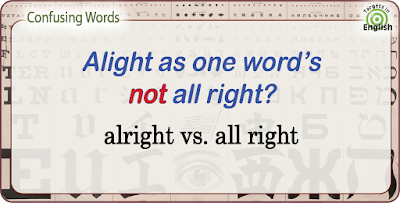Alright is not all right. But it may be very soon. Here's why.
Usage Rule: The one-word spelling, alright, is widely considered nonstandard (incorrect). Only the two-word spelling, all right, is acceptable, according to dictionaries and editing guides used by publishers. Most English teachers will agree.
Still, many young people and many writers disagree and get upset when they learn this usage rule.
Actually, the one-word spelling (alright) is nearly as old as the two-word spelling (all right).
And many people argue that the one-word form should be acceptable. They point to similar words like already (vs. all ready) and altogether (vs. all together).
Language authorities, however, disagree. Theodore Bernstein, a New York Times editor and writer on English usage in the 1980s, noted that already and all ready have very different meanings, as do altogether and all together.
Here are other authorities:
• Associated Press (2017): "Never alright."
• Chicago Manuel of Style (17th Ed.): "Two words. Avoid alight, which has long been regarded as nonstandard."
• American Heritage Dictionary: Alight is "nonstandard."
Best Advice: For school, work, and formal purposes, always use the two-word form, all right, and never the one-word form, alright.
But this may change soon. In this age of texting and 280-character tweets, the one word alright is even more appealing, and people who grow up on things like LOL and OMG are less likely to accept a rule demanding two words.
But for now ...
- It's not all right to spell this term as one word.
- Is it all right to use a dictionary during the test?
- You've been working hard. It's all right to take a break once in a while.
- You're getting married? All right!
(C) 2021 by Targets in English. All rights reserved.

